#Hades England
Text
@hetaween-event
Day 4: Underworld

This prompt compelled me to finally make another piece for my mythtalia AU in which Arthur is Hades, ruler of the Underworld!
Lyrics from the Voltaire song Land of the Dead.
#hetaween#hetaween 2023#hws england#aph england#hetalia#hws#aph#mythtalia#godtalia#hades arthur#hades England#underworld#land of the dead
32 notes
·
View notes
Text
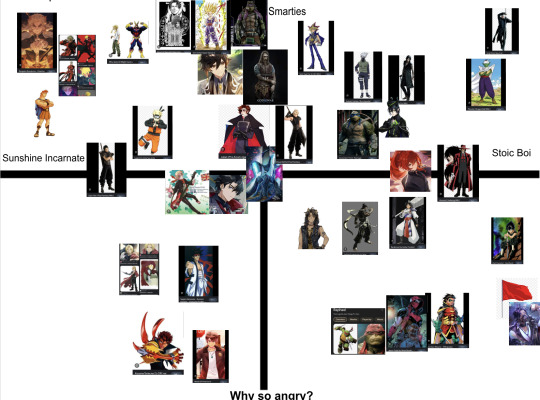
Made a fave list to see if I had a type due to a convo I had with a friend. I forgot several others like Haru from Rave Master. Oof!
Aside from placement being where I see their character... I am dead.
Too many tags. I know. (o´Д`o)ノ゙
#naruto#yyh hiei#damian wayne#jason todd#bankotsu#diluc ragnvindr#england hetalia#rengoku kyojuro#hades#all might#vash the stampede#nikola tesla#tmnt donatello#son gohan#genshin zhongli#tmnt leonardo#tmnt raphael#tyr god of war#hercules#zack fair#cloud strife#kakashi hatake#v dmc5#wriothesley#s cry ed#2p america#julian devorak#piccolo#dmc vergil#alucard
8 notes
·
View notes
Text
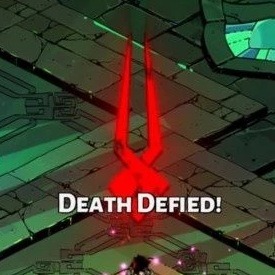
the queen finally passes and then this shows up above her head
22 notes
·
View notes
Text

Flowers.
Everywhere he looked, everywhere he could have gone, all around him, varying in sizes and colour. But whether they were white or colourful, big or small, each and every last one of them was so annoyingly bright that it burned out the eyes of a god that knew nothing but the eternal night of the lower realm.
Arthur had taken to sitting with his back against one of the olive trees that formed his prison, leaning against the coarse bark as he watched how the Sun-God kept on traversing the sky, ever following his course. It was only some time after noon that he spoke up again, ending his silent treatment of the other god.
"You couldn't have picked a spot with more shade?" he complained, all while attempting to find a spot to hide from the sun in what little shade was left now that the sun-carriage was directly overhead.
The God of Spring looked up from the bright pink flower he was holding on to, his eyes brighter even than the sky above as he focused on the deity he'd trapped.
"Why, is it too bright for you to sulk?"
That smirk returned, a mischievous little thing, an expression that had to have been created solely to drive the Lord of the Dead mad as he glared at Alfred. He rearranged the fabric of his chiton, attempted to use his hands to fan himself, only to fail miserably in the hot, windless air of the Eleusian mountains. Arthur was melting, and if it was not that, then he was surely about to catch on fire at any moment.
"Pardon me, but unlike you I'm not exactly known to frequent the Human Realm," he retorted, "I told the God of the Sun from the very beginning that he can keep that annoying carriage of his as far away from my kingdom as possible, if he so pleases."
Alfred laughed, dared laughing at his words, as he patted down the earth all around the flower he had just planted, carefully making sure that it was set in place. He waited a moment, then he sent a small rain of green sparks down onto the plant with a simple movement of his hand. Before his very eyes the plant began to grow, sprouting more leaves and blooming in a matter of seconds, all at the beck and call of the God of Spring. The petals of the flower split open, baring a colour even more vibrant than their outside, as though to attempt searing Arthur's eyes within seconds.
Alfred gave him another look, another smirk as his lips curled into that expression of smug amusement once more when he replied: "Well, it isn't my fault you're so terribly stuck up down there, is it? No wonder people don't want to die, they're scared they're going to die all over again from boredom once they reach that kingdom of yours."
The Lord of the Underworld opened his mouth to rebut, to defend the honour of his realm, but after a moment he simply closed it again without ever speaking a word. He pressed his lips together in a fine line and continued staring off into the distance, as far away as possible from that wheat-blond hair and those sky-blue eyes, from the stained, barely thigh-length tunic and those strong hands covered in earth and soil.
He didn't move again for the remainder of the day, simply sat there as the sun passed, no matter how hot it got. Arthur watched on as the sun passed, waiting hours until that blasted sun-god finally disappeared beyond the horizon to give him some respite. By the time he could feel any change in temperature, however, the linen of his chiton was soaked, his hair stuck to his forehead.
As a god he needed neither food nor drink, yet at that moment he felt thirstier than ever before, felt as though the heat of the sun had dried him out completely and left him void of any water.
Alfred had returned a while ago, stained green and brown all over and from head to toe, covered in earth and the remnants of leaves and grass and wheat, with sweat glistening on his skin and a shine in his eyes.
How was it that Arthur felt like little more than a melted piece of wax, a pitiful thing that was to become a puddle before long, whereas the God of Spring dared to appear unchanged save for that gem-like shimmer that surrounded him?
How dare he look like the most beautiful of jewels and yet escape Arthur's control so easily, control him instead?
His brows furrowed as he crossed his arms, flinching when he made contact with the skin of his arm. He hadn't let out any sound, but nonetheless his movement had drawn the attention of his captor.
"Wait, did you spend all day just sitting in the sun and waiting for me?" Alfred asked, brows raised as he stepped closer to that cage of olive trees and vines that appeared so out of place amidst the meadow.
Arthur had tried ripping the vines multiple times while the other was gone, if he was honest. Of course he had, he couldn't just let himself remain trapped this way, he was stronger than that, one of the three sons of the youngest of the twelve titans. And yet it seemed the Spring-god's powers had reached even them, as whenever he'd torn one of the vines, two more sprouted forth to take its place.
"What else was I meant to do?" he griped, "You didn't quite leave me the room to do much."
He gestured vaguely at his cage.
While the circular shape left him some space, it was still little more than ten feet across.
The God of Spring rolled his eyes, but dropped down onto his knees right beside him, reaching out to examine his arm and shoulder. Arthur grit his teeth, unwilling to give the other the satisfaction of hearing a single sound escape his lips, but his pain was obvious by the way he flinched away from even the slightest of touches.
"You're all burnt up...," the god muttered, "Did nobody ever tell you not to stay in the sun for too long?"
Arthur rolled his eyes, pulling his arm from the other's grip with a sudden motion. He felt as though fire was burning beneath his very skin, but he dared not voice his pain.
"How often do I have to say it?" the Lord of the Underworld bit out, "My realm does not know the sun, has never seen it for even a second!"
"But you have to have visited the Human Realm, right? This can't be the first time you're up here!"
"Oh, right, pardon me," Arthur retorted, "I'm sure with the stacks of paperwork that collects on my desk with each and every soul that passed the river Styx I get in my yearly vacation."
Alfred didn't seem to take no for an answer: "But you couldn't have been born there, right? It's a place of the dead, you have to have come from somewhere else!"
"Oh, sure! I was born here, but when that happened I was given two days before my dear old father devoured me. So no, I didn't have any time to sunbathe back then, either."
Whereas Arthur's expression had gotten darker and darker with every word, Alfred had paled significantly. The last words had slipped past his lips without another thought, startling the younger, so much younger, so much more innocent god. Alfred did not know the titans, did not know their cruelty, did not know the rulers that had come before the Olympians and their kin.
He didn't know of the atrocities committed by the one Arthur dared not call his father.
The Spring-god stared at him with wide eyes, but after a moment he regained his composure.
"I- Um. Sorry you had to-... Wait a moment, I'll help with the burns," he stammered at last.
He extended his hands towards the barren ground that surrounded Arthur by several feet, a testament to the aura of death that surrounded him even now, separated from his realm. If exposed to his power for too long, the flowers, the grass, all would die.
There was another shimmer of green, and a small plant sprouted from between Alfred's palms, slowly but surely growing into a thick and sturdy plan with small, triangle-shaped leaves that grew in circles around the centre. Given that there was no sun nor plants in his realm Arthur had no chance of identifying it, but that did not matter to him.
"And what is more decoration meant to help me with?" he questioned, "It's obvious it will be dead within a couple of hours anyway."
He watched on in confusion as the other deity broke off part of that little plant he'd just created, created just to break it again. Arthur couldn't quite determine what part of the plant he'd broken off with its strange appearance, whether it was a leaf or part of a bloom, but Alfred continued breaking off some more pieces before looking up again.
"So you're killing it yourself now?" he muttered, "I hope you're aware I don't gain anything from dying plants? Humans, fine, but even then it's mostly paperwork, so spare yourself the trouble."
There was a moment of silence, then he added: "Hell, I wouldn't even get to take care of the paperwork, given I'm, you know, trapped in this godforsaken realm."
Alfred remained quiet, simply extended a hand to Arthur, who marvelled at the way the vines made way for their creator's hand, leaving a hole in the wall of this cage the God of Spring had created for him. He wasn't sure what got him to do it, but Arthur extended his hand, baring the searing red skin of his arm to the other god, no matter what strange leaves he was holding on to and no matter the fact he had him trapped far away from his own kingdom.
"You truly are as red as a poppy," Alfred muttered, more to himself than to Arthur as he examined the sunburnt skin. There was a smile in his words, something that made Arthur's heart flutter ever so slightly, not that he knew why.
Did he even have a heart?
Was there truly a reason for him to have a heart, if he was meant to rule the dead, the pulse- and the blood-less?
He did not know, and there was something unsettling about that thought.
Before the Lord of the Underworld could find an answer, Alfred pressed the spot where he'd broken off the leaf against his skin, uncaring for the searing pain that shot through his arm like one of his blasted brother's lightning bolts. Until all of a sudden, the pain was gone.
It felt as though he'd jumped into the river Lethe and forgotten all about the pain as the cold flooded and numbed the burning, searing pain. A sharp hiss passed his lips, and with a small smile Alfred moved the leaf farther along his arm, spreading the soothing liquid and swapping for a new leaf every now and then.
A small sigh escaped Arthur's lips as his left arm felt pleasantly cool once more, and he could feel all that tension he hadn't even known he was holding on to just fall off his shoulders all at once.
"What is that?" he asked, marvelling at what must surely have been magic.
"It's aloe," Alfred explained with a small smile, "It helps with sunburn. I figured it would help make you more bearable, given you're stubborn enough to burn yourself all to pout."
Their eyes met for a moment, and though Arthur had meant to glare at the other for that remark, he couldn't quite manage to hold his expression. He had trouble not laughing with the way the God of Spring was looking, the tip of his tongue peaking through between his lips as he concentrated on spreading the slimy liquid leaking from the aloe leaf.
"So even plants help the humans stay away from my realm, hm?" he wondered, "One might truly think they hate me... Or is it you?"
"What, with that lovely demeanor and sharp tongue of yours? How could I ever hate you, Your Highness, King of the Underworld?"
Alfred was laughing at him, breaking his mocking tone long before he reached the end of his sentence, breaking into bright, bell-like laughter as he ducked beneath Arthur's hand, which had come up to slap him, only to be tangled by the vines of his cage.
"Too slow!" Alfred exclaimed with a giggle.






#fanfiction#usukus#writing#aph america#aph england#aph hetalia#ck myth au#greek myth retellings#hades persephone#usuk#hetalia
9 notes
·
View notes
Text
Good afternoon, you cannot define "amazon" in greek antiquity in a self-consistent way that doesn't include every reasonable woman in the epics
#out of character#I'm playing hades again and remembering the early days of gerudo research#for a fantasy category that's so well defined and consistent in modern tropes#christ god is it difficult to include all amazons while exluding others#it's partially because saying “ancient greece” is like saying “England” and expecting everything to apply from 200 AD to modern day england#but. realstically the best way to describe an amazon without excluding them is “woman who has had violent thoughts towards men”?#you could maybe make the argument that any woman who kills a man in the epics is an amazon#and in some texts that's true#but that also includes a lot of women who are *not* supposed to be amazons thematically#because the term “amazon” has to carry a measure of fear and disgust in most texts and#listen it's complicated#all i wanted to know was about women who rode horses and we got into athenians being bizarre about gender again
3 notes
·
View notes
Text
Look at this... 👀
Look at this... 👀 https://pin.it/6JHu5EogW
Ctrl alt del
#science#artists on tumblr#my art#books#hades supergiant#hades game#spotify#goat#book review#lucifer#math and physics#physics#im different#ariana grande#government#england#united nations#united states#united kingdom#portugal england uk nickelodeon brazil nyc usa
0 notes
Text
Jokes and Pranks: Here is the April Fools’ Day Origin Story | Ancient Origins
https://www.ancient-origins.net/history-important-events/jokes-and-pranks-here-april-fools-day-origin-story-009831

View On WordPress
#1561#1582#16th century#1752#Ancient Rome#April 1#April Fool&039;s Day#Eduard de Dene#England#Europe#Feast of Fools#France#Gregorian Calendar#Hades#Herod#Hilaria#January 1#Jesus#Julian Calendar#March 25#Medieval#Museum of Hoaxes#Persephone#Pluto#Pontius Pilate#Proserpina#Saturnalia
0 notes
Text
I have a dumb fanfic concept in my head where Zagreus gets pulled through time from Mythic Greece to Dark Ages England because some skinny young mortal squire pulled the Stygian Blade out of a rock, which is a big deal apparently.
Zag is pretty sure this is a temporary situation that will sort itself out eventually, but while he’s here he might as well help train this kid to be a proper warrior and king. He also tries to explain to mortals that he’s the son of Hades, king of the underworld, but nobody quite gets it and this is how the myth of Merlin being the son of a demon starts.
164 notes
·
View notes
Text
BEAUTIFUL CRIME | LW

BEAUTIFUL CRIME ⸻ persephone! leah williamson x hades! leitor.

Warning: Based on fictional books about Greek mythology, alternate universe - modern, Reader and Leah are soccer players, Reader is a female version of Hades, Leah doesn't remember her past life but Reader does. English is not my first language!
Y/N, since she was a little girl, was an ordinary girl in a small town. Her days were filled with school, friends, family, and above all, a passion for football. The ball was her inseparable companion, and the field, her stage. She dreamed of becoming a professional player, and at the age of 18, her dream opportunity came true: a spot on Chelsea, one of England's biggest clubs.
However, the fulfillment of this dream was accompanied by strange events. Vivid and recurring dreams transported her to an ancient world of gods and mythology. In these dreams, she was Hades, the Greek god of the Underworld, and lived a forbidden love story with Persephone, the goddess of spring.
The images were so real that Y/N felt the emotions of the characters as if they were her own. Confused and scared, she decided to tell her parents about the dreams. They listened attentively, but as always, downplayed the situation, thinking it was just stress or anxiety from football.
Frustrated and without answers, Y/N also sought help from a psychologist. However, the professional didn't pay much attention to the dreams, classifying them as simple fantasies. Feeling lost and unsupported, Y/N decided to move on, focusing on football.
At Chelsea, she quickly became one of the most talented players on the team, earning the admiration of fans and teammates. Among them was Leah Williamson, the talented defender of Arsenal, Chelsea's rival. Leah was different from all the other women Y/N had ever met. There was something about her that inexplicably drew her in.
In one of the most important matches of the championship, Y/N found herself face to face with Leah. The tension was palpable, and in the heat of the moment, Y/N looked directly into the defender's blue eyes. At that moment, something extraordinary happened.
A surge of energy ran through Y/N's body, and she fainted on the field. When she woke up in the hospital, everything was different. The memories of the dreams were mixed with reality, and Y/N finally understood the truth: she was not just Y/N, the football player. She was Hades, the god of the Underworld, and Leah Williamson was Persephone, his beloved goddess of spring.
The locker room buzzed with post-game chatter, the air thick with the mingled scents of sweat, adrenaline, and victory. Y/N, still basking in the glow of a hard-fought win, found their gaze drawn to Leah Williamson, the Arsenal defender who had been their nemesis on the pitch.
Leah stood out from the crowd, her presence both imposing and enigmatic. Her fiery blonde hair cascaded down her shoulders, framing a face that was both striking and serene. Y/N couldn't help but admire the way Leah carried herself, with an air of quiet confidence that radiated power.
When their eyes met, Y/N felt a familiar jolt of electricity surge through their veins. The same spark that had ignited during their previous encounter on the field now flickered between them, creating an undeniable connection.
Y/N's heart pounded in their chest as they approached Leah, their mind racing with a thousand unspoken words. They wanted to tell Leah about the dreams, about the strange and undeniable feelings that were churning inside them. But they hesitated, unsure of how Leah would react.
Leah's gaze softened as Y/N drew closer, her lips curving into a playful smile. "Well, well, if it isn't Chelsea's underworld Hades," she teased, her voice laced with amusement.
Y/N's cheeks flushed, a mix of embarrassment and delight. "I'm not Hades," they protested weakly.
Leah's laughter echoed through the locker room, attracting curious glances from their teammates. "Oh, come on, Y/N," she said, shaking her head. "You're as dark and mysterious as the Underworld itself."
Y/N couldn't help but smile back at Leah, their heart fluttering with a new sense of lightness. Leah's playful banter was disarming, a welcome contrast to the intensity of their rivalry on the field.
"And you," Y/N replied, their voice gaining confidence, "are as radiant as the spring sun itself."
Leah's smile widened and her eyes sparkled with mischief. "Well, I do have a soft spot for flowers," she admitted.
Y/N felt a surge of hope. Could this be a sign? Could Leah be open to more than just a friendly rivalry?
Before Y/N could respond, a teammate called out, interrupting their conversation. The locker room emptied as the players headed for the showers and changing rooms, leaving Y/N and Leah alone.
The silence stretched between them, heavy with unspoken words and possibilities. Y/N took a deep breath, their heart pounding in their chest. This was it. The moment to take a chance, to step out of the shadows and into the unknown.
"Leah," Y/N began, their voice trembling slightly. "I..."
Leah's eyes met theirs, a flicker of curiosity dancing in their depths. "Yes?" she prompted, her voice soft and inviting.
Y/N took another deep breath, steeling their nerves. "I want to take you out," they blurted out, their words tumbling over each other.
Leah's eyes widened in surprise, a hint of a smile playing on her lips. "Really?" she asked, her voice laced with amusement.
Y/N nodded, their heart pounding in their chest. "I mean it," they said, their voice gaining strength. "I've never felt this way about anyone before."
Leah's smile widened, her eyes sparkling with a newfound warmth. "Well, I've never been asked out by a Hades before," she said, her voice teasing. "But I think I might be able to make an exception."
Y/N's heart soared as a wave of relief and joy washed over them. They had done it. They had taken the chance, and it had paid off.
As they walked out of the locker room together, Y/N couldn't help but grin. The future was uncertain, but one thing was for sure: it was going to be an exciting ride.
Y/N looked at Leah, her heart pounding in her chest. "Leah," she began, her voice barely a whisper, "I...".
Leah's eyes met hers, and for a moment, the world around them seemed to fade away. Y/N felt a connection with Leah that went beyond words, a bond that transcended the boundaries of time and space.
But just as Y/N was about to pour out her heart, Leah's expression changed. A mischievous glint appeared in her eyes, and she leaned in close, whispering in Y/N's ear.
"Maybe another time, Hades," she said, her voice laced with promise. "But for now, let's keep this between us."
With that, Leah turned and walked away, leaving Y/N standing there, her heart pounding with a mix of confusion and excitement. What was Leah trying to say? What did she mean by "another time"?
Y/N was left with more questions than answers, but one thing was for sure: her feelings for Leah were more undeniable than ever. And she knew she would do whatever it took to win Leah's heart, even if it meant facing the gods themselves.
143 notes
·
View notes
Text
@prukweek
Day 4: Myths & Gods
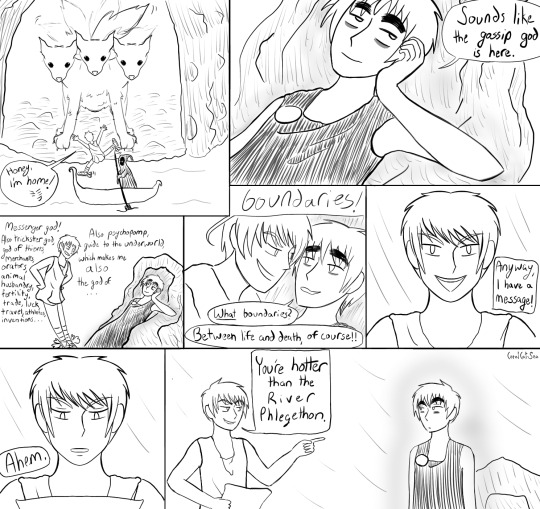
#prukweek2022#aph england#hws england#arthur kirkland#aph prussia#hws prussia#pruk#engpru#hetalia#aph#hws#gilbert beilshmidt#mythtalia#godtalia#Hermes Prussia#Hades England#Hades Arthur#Hermes Gilbert
26 notes
·
View notes
Text
Paradise Lost: How John Milton's 1667 work influenced "Hazbin Hotel"
I've been thinking about why the "fruit of knowledge" in Hazbin Hotel is depicted as an apple, as opposed to another fruit that would've been more accurate to the Middle East during the Fall of Man, as well as how Paradise Lost by John Milton (1667) influenced the show.
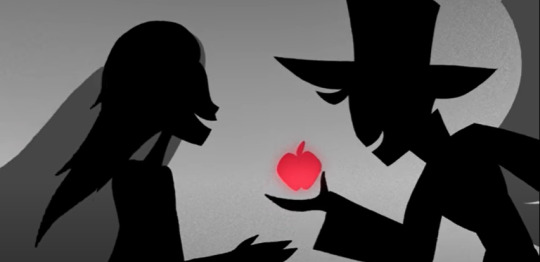
Per one source:
"Because the Hebrew Bible describes the forbidden fruit only as 'peri', the term for general fruit, no one knows [what exactly type of fruit it was]. It could be a fruit that doesn't exist anymore. Historians have speculated it may have been any one of these fruits: pomegranate, mango, fig, grapes, etrog or citron, carob, pear, quince, or mushroom."
Per Wikipedia:
"The pseudepigraphic Book of Enoch describes the tree of knowledge: 'It was like a species of the Tamarind tree, bearing fruit which resembled grapes extremely fine; and its fragrance extended to a considerable distance. I exclaimed, How beautiful is this tree, and how delightful is its appearance!' (1 Enoch 31:4)."
In Jewish and Islamic traditions, the "fruit of knowledge" is commonly identified with grapes. The Zohar explains that Noah attempted (but failed) to rectify the sin of Adam by using grape wine for holy purposes. Today, the "Noah grape" is still used to make white wine.

Furthermore:
"The association of the pomegranate with knowledge of the underworld as provided in the Ancient Greek legend of Hades and Persephone may also have given rise to an association with knowledge of the 'otherworld', tying-in with knowledge that is forbidden to mortals. It is also believed Hades offered Persephone a pomegranate to force her to stay with him in the underworld for 6 months of the year. Hades is the Greek god of the underworld, and the Bible states that whoever eats the forbidden fruit shall die."
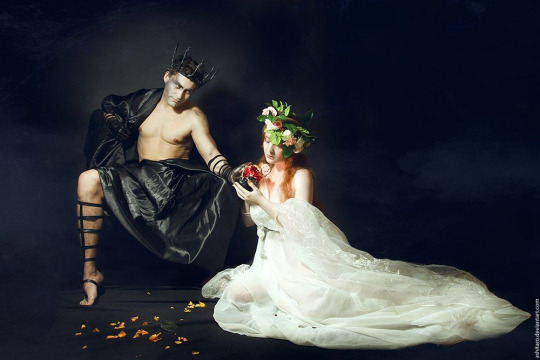
So, how then did the apple become the foremost symbol of the "fruit of knowledge"? You can partly thank Paradise Lost by English poet John Milton, a work which the lore of Hazbin Hotel is based off of.
Milton published the book in 1667, a time when the hedonistic Restoration era was in full swing. The exiled King Charles II was restored to the throne as King of England in 1660, and was a party animal, with dozens of mistresses, and nicknamed both the "playboy prince" and "Old Rowley", the latter after his favorite lustful stallion.
However, the association of the "fruit of knowledge" began with a Latin pun long before Milton immortalized the association in Paradise Lost. Per the linked article above by Nina Martyris for NPR:
"In order to explain, we have to go all the way back to the fourth century A.D., when Pope Damasus ordered his leading scholar of scripture, Jerome, to translate the Hebrew Bible into Latin. Jerome's path-breaking, 15-year project, which resulted in the canonical 'Vulgate', used the Latin spoken by the common man. As it turned out, the Latin words for evil and apple are the same: 'malus'.
[...] When Jerome was translating the 'Tree of the Knowledge of Good and Evil', the word 'malus' snaked in. A brilliant but controversial theologian, Jerome was known for his hot temper, but he obviously also had a rather cool sense of humor.
'Jerome had several options,' says Robert Appelbaum, a professor of English literature at Sweden's Uppsala University. 'But he hit upon the idea of translating 'peri' as 'malus', which in Latin has two very different meanings. As an adjective, 'malus' means 'bad' or 'evil'. As a noun it seems to mean an apple, in our own sense of the word, coming from the very common tree now known officially as the 'Malus pumila'. So Jerome came up with a very good pun.'
The story doesn't end there. 'To complicate things even more,' says Appelbaum, 'the word 'malus' in Jerome's time, and for a long time after, could refer to any fleshy seed-bearing fruit. A pear was a kind of 'malus'. So was the fig, the peach, and so forth.'
Which explains why Michelangelo's Sistine Chapel fresco features a serpent coiled around a fig tree. But the apple began to dominate Fall artworks in Europe after the German artist Albrecht Dürer's famous 1504 engraving depicted the First Couple counterpoised beside an apple tree. It became a template for future artists such as Lucas Cranach the Elder, whose luminous Adam and Eve painting is hung with apples that glow like rubies.
Milton, then, was only following cultural tradition. But he was a renowned Cambridge intellectual fluent in Latin, Greek and Hebrew, who served as secretary for foreign tongues to Oliver Cromwell during the Commonwealth. If anyone was aware of the 'malus' pun, it would be him, and yet he chose to run it with it. Why?
Appelbaum says that Milton's use of the term 'apple' was ambiguous. 'Even in Milton's time the word had two meanings: either what was our common apple, or, again, any fleshy seed-bearing fruit. Milton probably had in mind an ambiguously named object with a variety of connotations as well as denotations, most but not all of them associating the idea of the apple with a kind of innocence, though also with a kind of intoxication, since hard apple cider was a common English drink.'
It was only later readers of Milton, says Appelbaum, who thought of 'apple' as 'apple', and not any seed-bearing fruit. For them, the forbidden fruit became synonymous with the 'malus pumila'. As a widely read canonical work, 'Paradise Lost' was influential in cementing the role of apple in the Fall of Man story."
To tie this back into John Milton's relationship with King Charles II of England, as mentioned, Milton originally served Oliver Cromwell, Lord Protector of England, and the English Commonwealth, which was formed with the overthrow and execution of King Charles I on 30 January 1649, following the bloody English Civil War (1642 – 1651).
The King's two sons - the newly-christened King Charles II, the elder, and James, Duke of York (King James II), the younger - fled into exile on the European continent. However, with the death of Oliver Cromwell on 3 September 1658 came the 2-year-long dissolution of the English Commonwealth, and the restoration of the monarchy.
As for Milton himself, we can look to an article by Bill Potter.
Milton, born on 9 December 1608, was around 51-52 years old when King Charles II was restored to the throne. He attended Christ's Church, Cambridge in his youth, and mastered at least six languages, as well as history and philosophy; making him, perhaps, the most knowledgeable poet in history. He spent more than a year travelling across Europe, conversing with and learning from intellectuals, linguists, poets, and artists, including the famous Galileo Galilei.
However, Milton was a controversial figure of his time, being unafraid to criticize institutions of authority; arguing that "divorce was Biblical", for which he was routinely condemned; joining the Puritans; penning the Areopagitica, a treatise on liberty in favor of Parliament and the Roundhead rebels, during the reign of King Charles I, arguing that the King must be held accountable by the people; and agreed with and justified the murder of King Charles I, for which Parliament hired him in 1649 as a propagandist and correspondence secretary to foreign powers, on account of his fiery manifestos against "the man".
The collapse of the Commonwealth with the death of Oliver Cromwell in 1658 did not deter Milton from continued political writing against the monarchy and the new public sentiment that brought about its Restoration under King Charles II in 1660. On the contrary, Milton - now totally blind, having lost his eyesight by the age of 44 in 1652, a decade earlier - began writing Paradise Lost in 1661, and spent the next six years dictating the work to transcribers.
A supporter of regicide, Milton was also forced into exile himself, and faked his own death, as Charles refused to pardon - and sought to execute - any of those directly involved with his father's murder. Milton's friends held a mock funeral for Milton on 27 August 1660, just months after the coronation of King Charles II on 23 April 1660.
King Charles II commented that he "applauded his [Milton's] policy in escaping the punishment of death [execution for treason] by a reasonable show of dying", but insisted on a public spectacle nonetheless by having Milton's writings burned by the public hangman.
After eventually obtaining a general pardon from King Charles II, Milton was imprisoned, and released, likely due to political friends in high places. He died, aged 64, in 1674. His theological views were sometimes considered heterodox by the best Puritans, and his political views came close to getting him executed on several occasions. His poetry, however, has endured as some of the greatest works in the English language, especially Paradise Lost; much of his greatest work was written during his 22 years of complete blindness.
One of the main factors in King Charles II deciding to grant a pardon to Milton was, ironically, Paradise Lost. While originally written by Milton as a scathing criticism of King Charles II and the monarchy - depicting Lucifer Morningstar as a sympathetic rebel against God, with King Charles II claiming that is right to rule came from "divine ordainment" - Charles II enjoyed the work, and authorized its publication on 20 August 1667. We know this because a 1668 copy of Paradise Lost in royal bindings by Samuel Mearne, bound lovingly in a fine red leather made of goat skins tanned with sumac, and stamped in gold with the royal cypher of King Charles II, was found. The endpapers bore a watermark with the royal arms of Charles II.
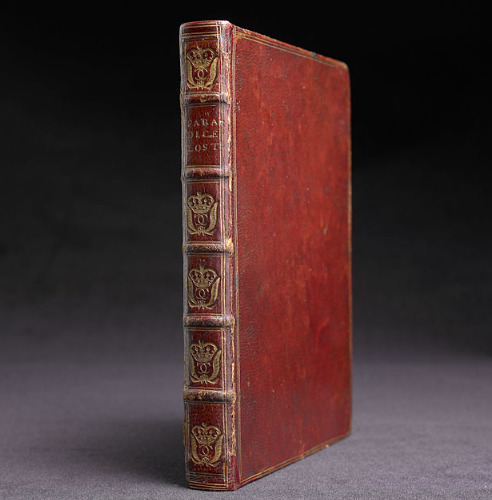
Per one Miltonian scholar: "The most single important event in Milton's life was the event against which he struggled most: the Restoration of Charles II, [and his relationship with the King]. Had it not come, we might have never had Paradise Lost...certainly, we should never have had [it] in [its] present power and significance."
Milton followed up Paradise Lost with Paradise Regained in 1671, three years before his death, with advice for King Charles II, urging the hedonistic Charles to "reign over himself and his passions":
"For therein stands the office of a King, His Honour, Vertue, Merit and chief Praise, That for the Publick all this weight he bears. Yet he who reigns within himself, and rules Passions, Desires, and Fears, is more a King; Which every wise and vertuous man attains: And who attains not, ill aspires to rule Cities of men, or head-strong Multitudes, Subject himself to Anarchy within, Or lawless passions in him which he serves." - John Milton, Paradise Regained, Book II, lines 463-472
To summarize: "If we must have a King back again, my Lord, please try to be a good man, unlike your father, who fell to his pride, [which was also the downfall of Lucifer]."
To quote another source: "Though the passage begins by noting that the office of a King is to bear the weight of public concerns, it is the control of one's private concerns that truly set a King apart as a virtuous character. Indeed, so important is self-command that any wise or virtuous man who attains it is like a king; any king who does not practice [self-command] is nothing more than a mere subject, ruled by anarchy and lawlessness."
Milton's words, too, echo a work written by Charles' grandfather, King James VI/I of Scotland and England: Basilikon Doron ("Royal Gift").
Per Wikipedia:
"'Basilikon Doron' (Βασιλικὸν Δῶρον) means 'royal gift' in Ancient Greek, and was written in the form of a private letter to James' eldest son, Henry, Duke of Rothesay (1594–1612). After Henry's death, James gave it to his second son, Charles, born 1600, later King Charles I. Seven copies were printed in Edinburgh in 1599, and it was republished in London in 1603, when it sold in the thousands.
This document is separated into three books, serving as general guidelines to follow to be an efficient monarch. The first describes a king's duty towards God as a Christian. The second focuses on the roles and responsibilities in office. The third concerns proper behaviour in daily life.
As the first part is concerned with being a good Christian, James instructed his son to love and respect God as well as to fear Him. Furthermore, it is essential to carefully study the Scripture (the Bible) and especially specific books in both the Old and New Testaments. Lastly, he must pray often and always be thankful for what God has given him.
In the second book, James encouraged his son to be a good king, as opposed to a tyrant, by establishing and executing laws as well as governing with justice and equality, such as by boosting the economy. The final portion of the Basilikon Doron focuses on the daily life of a monarch.
All of these guidelines composed an underlying code of conduct to be followed by all monarchs and heads of state to rule and govern efficiently. James assembled these directions as a result of his own experience and upbringing. He, therefore, offered the 'Basilikon Doron' ('Royal Gift') to his son, with the hope of rendering him a capable ruler, and perhaps to pass it down to future generations.
Overall, it repeats the argument for the divine right of kings, as set out in 'The True Law of Free Monarchies', which was also written by James. It warns against 'Papists' (Roman Catholics) and derides Puritans, in keeping with his philosophy of following a 'middle path', which is also reflected in the preface to the 1611 King James Bible. It also advocates removing the Apocrypha from the Bible."
King James VI/I further instructed his son and grandson:
"A good monarch must be well acquainted with his subjects, and so it would be wise to visit each of the kingdoms every three years."
"During war or armed conflict, he should choose old-but-good captains to lead an army of young and agile soldiers."
"In the court and the household, [a royal] should carefully select loyal gentlemen and servants to surround him. When the time came to choose a wife, it would be best if she were of the same religion and had a generous estate. However, she must not meddle with governmental politics, but perform her domestic duties."
"As for inheritance, to ensure stability, the kingdom should be left to the eldest son, not divided among all children."
"Lastly, it is most important...that [a royal] would know well his own craft...to properly govern over his subjects. To do so, [one] must study the laws of the kingdom, and actively participate in the council. Furthermore, [one] must be acquainted with mathematics for military purposes, and world history for foreign policy."
"[A royal] must also not drink and sleep excessively. His wardrobe should always be clean and proper, and he must never let his hair and nails grow long. In his writing and speech, he should use honest and plain language."
King James VI/I further supplemented Basilikon Doron with a written treatise titled The True Law of Free Monarchies: Or, The Reciprocal and Mutual Duty Between a Free King and His Natural Subjects.
"It is believed King James VI/I wrote the tract to set forth his idea of absolutist monarchism in clear contrast to the contractarian views espoused by, among others, James' tutor George Buchanan (in 'De Jure Regni apud Scotos'), [which] held the idea that monarchs rule in accordance of some sort of social contract with their people. James saw the divine right of kings as an extension of the apostolic succession, as both not being subjected by humanly laws."
Milton's own Areopagitica was a follow-up on De Jure Regni apid Scotos by George Buchanan, and also to The True Law of Free Monarchies, as well as the idea of the "divine right of kings". It takes its title in part from Areopagitikos (Greek: Ἀρεοπαγιτικός), a speech written by Athenian orator Isocrates in the 4th century BC.
Most importantly, Milton also wrote on the concept of free will: "Milton's ideas were ahead of his time in the sense that he anticipated the arguments of later advocates of freedom of the press by relating the concept of free will, and choice to individual expression and right."
The concept of free will, too, was a major topic explored in Paradise Lost. Per one source: "In 'Paradise Lost', Milton argues that though God foresaw the Fall of Man, he still didn't influence Adam and Eve's free will. [...] God specifically says that he gives his creatures the option to serve or disobey, as he wants obedience that is freely given [or chosen], not forced. Some critics have claimed that the God of the poem undercuts his own arguments; however, Milton did not believe in the Calvinistic idea of 'predestination' (that God has already decided who is going to Hell and who to Heaven), but he often comes close to describing a Calvinistic God. God purposefully lets Lucifer (Satan) escape Hell, and sneak past Uriel into the Garden of Eden, and basically orchestrates the whole situation so that humanity can be easily ruined by a single disobedient act. In describing the Fall of Man before it happens, God already predicts how he will remedy it, and give greater glory to himself by sending his Son [Jesus Christ] to die, and restore the order of Heaven."
In Hazbin Hotel, Adam also describes the Calvinistic idea of 'predestination', and that "the rules are black and white":

However, "This possible predestination leads to the theory of the 'fortunate fall', which is based on Adam's delight at learning of the eventual coming of the Messiah [from his bloodline]. This idea says that God allowed the Fall of Man, so that he could bring good out of it, possibly more good than would have occurred without the Fall, and be able to show his love and power through the incarnation of his Son. In this way, the free will of Adam and Eve (and Lucifer/Satan) remains basically free, but still fits into God's overarching plan."
However, there is one major flaw with this, and that is that we don't know if Jesus Christ exists within the Hazbin Hotel universe or not. Yet Charlie Morningstar, the daughter of Lucifer Morningstar and Lilith, and the "Princess of Hell", is depicted as a savior-esque figure within the show who, like God in Paradise Lost, encourages lowly sinners to choose obedience to God out of their own free will. More interestingly, Charlie does not come from Adam's bloodline; yet, while Lucifer decries 'free will', Charlie supports 'free will' instead.
Perhaps is is merely because Charlie, being the daughter of Lucifer and Lilith, claims to want to fulfill Lilith's "dream" of humanity being empowered in Hell ("The mind is its own place, it can make Heaven out of Hell, or Hell out of Heaven" - Lucifer, Paradise Lost); however, I think it also stems from Charlie having a genuine belief that 'free will', and people choosing to do good instead of evil, is "good" and "Godly".
True to Paradise Lost, this is also in fulfillment of God's plan; and, according to one fanfiction, why God allowed Charlie to be born to Lucifer and Lilith, so that sinners may be redeemed through Charlie.
For more on differing interpretations of 'free will', I suggest reading: "Free Will and the Diminishing Importance of God's Will: A Study of Paradise Lost and Supernatural" by Kimberly Batchelor (2016)
Excerpt: "'Paradise Lost' –and Milton’s purpose for writing the poem— is rooted deeply in postreformation Arminianism and this is apparent in its employment of free will. Chapter 1 argues that Milton turns to free will as a tool to justify the actions of God. Freedom of choice is God-given, and sets up a morality in which right and wrong are dictated by God. Chapter 2 shows that in 'Supernatural', free will is not given by a higher power; and, in fact, free choice functions as an act of defiance against God's will."
This raises the question: Is 'free will' given by God, using Lucifer as his vessel, in Hazbin Hotel, as in Paradise Lost? Or is 'free will' not given by a higher power; and, in fact, an act of defiance against God?
This brings us back around to our first question: Why is an apple, or 'malus', used to depict the "fruit of knowledge", especially if 'malus' means 'bad or evil', whereas Milton depicts 'free will' as God-given?
Well, for one, Lucifer still chooses to associate himself with apple symbolism and imagery, despite being skeptical of free will:
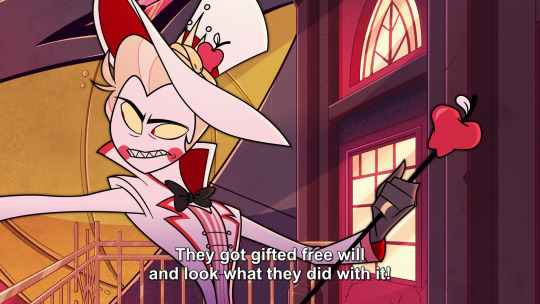
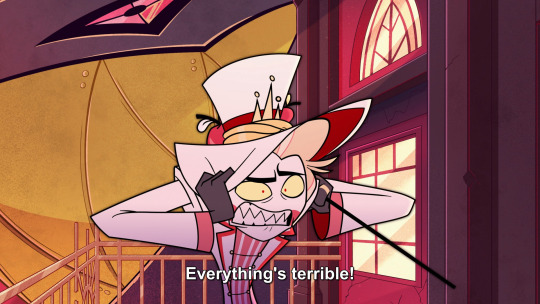
Based on the introduction to Episode 1, Charlie also views 'free will' as a gift (Miltonian), whereas Lucifer appears to view it as a curse.
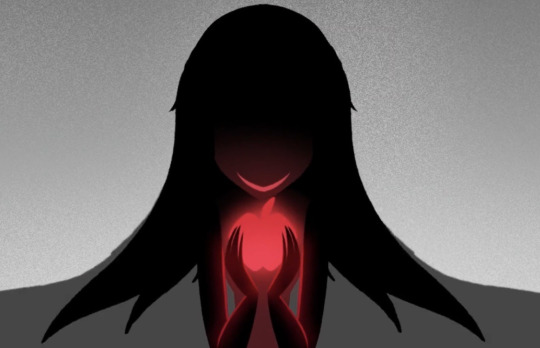
However, Charlie also notes that it was through the 'gift' of free will that the "root of all evil" entered the world, for if mankind could choose to be good, then they could also choose to be evil ('malus').
John Milton states in Paradise Lost: "Of Man's First Disobedience, and the Fruit Of that Forbidden Tree [malus], whose mortal taste Brought Death (evil, malus) into the World, and all our woe."
Thus, the use of an apple specifically is likely a tie-in to what others have been speculating about a character that series creator Vivienne Medrano (Vivziepop) alluded to a while back: "The Root of All Evil".
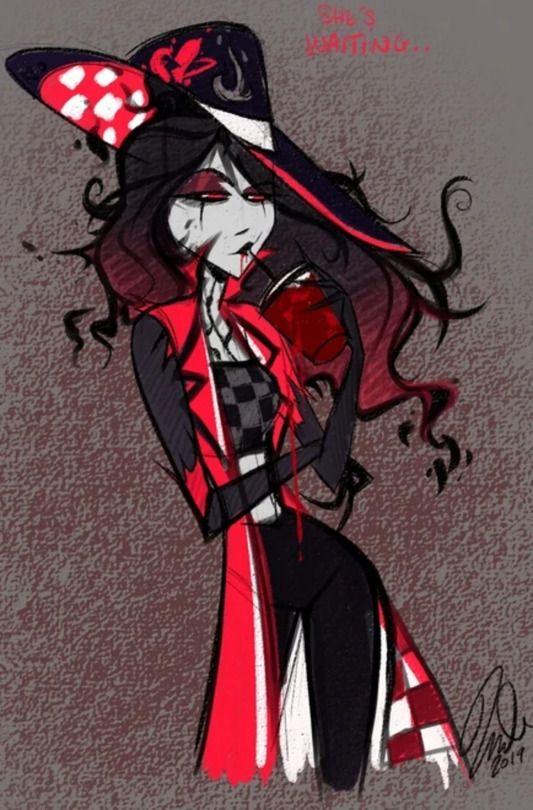
However, "Roo" itself is depicted as possessing the body of a human woman, presumably Eve, the first one to eat the "fruit of knowledge":
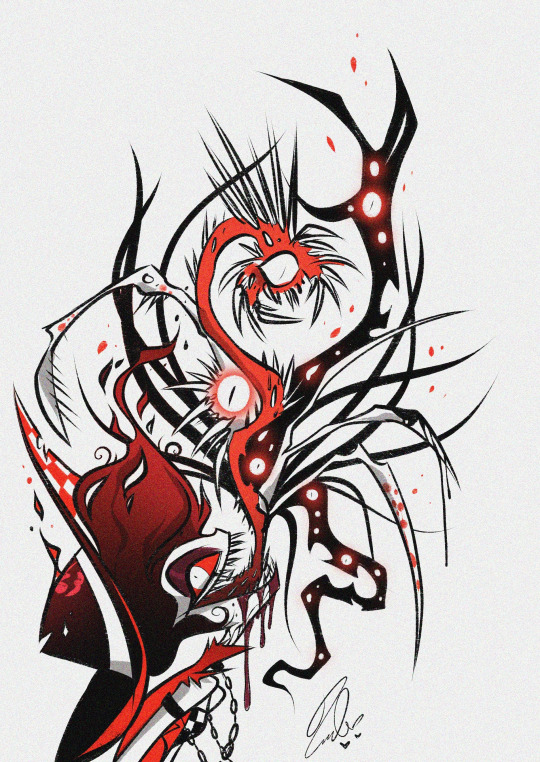
Thus, we can discern that "Malus" likely refers to this character. (Also see: "Maleficent", a name that also uses the root word "mal", "evil".) As for Roo's intentions, if Charlie is "good" - and, if, in fact, Alastor was sent by "Roo" (Eve) - then they may want for Alastor to work on their behalf to "corrupt" Charlie, or make sure the hotel never succeeds.
This is because demonic power is tied to human souls, and there are "millions of souls" in Hell, which likely fuels the great power of "Roo". The more souls there are in Hell, the more powerful "Roo" becomes. The Overlords also get their demonic power from "millions of souls".
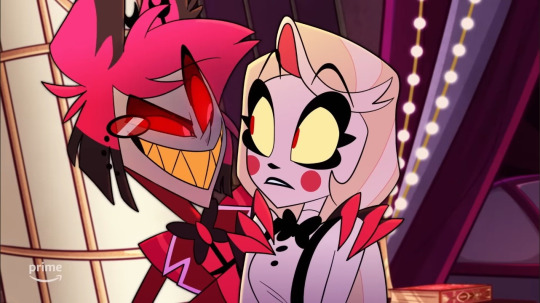
The deal between Eve and "Roo" might even be the first contract, or deal, between a human soul and a demonic entity; in exchange for 'free will', and the knowledge of good and evil, Eve allowed the "Root of All Evil" to inhabit her body, and to escape the void or prison it was confined to by Heaven (Hell?). (For one cannot be 'all-good' unless you attempt to 'eliminate' or 'ablate' evil; and, in Greek mythology, Zeus imprisoned the Titans in Tartarus for all of their evil deeds.)
Another possibility, brought up in an article by Gillian Osborne, is that Lucifer sees the "fruit of knowledge" as an apple, but it may appear as different fruits to different people, depending on how they view it. This also fits with Lucifer and angels being able to easily shapeshift.
In Paradise Lost, only Lucifer describes the fruit as an "apple" (malus), as he associates malus with "bad, evil", while the narrator also describes the fruit as "a mix of different colors" and peach-like. This then begs the question: "Did the fruit of knowledge of good and evil become 'evil' because Eve harbored resentment towards Adam?"
Quote: "Lucifer (Satan) gives Eve yet another hint that this tree may be more complicated than he wishes her to believe: although elsewhere in Milton's poem Eden is heady with its own newness, sprouting spring flowers left and right, the tree of knowledge is already old: its trunk is 'mossie'. Nevertheless, Lucifer claims to wind himself around the tree 'soon'; the quickness of his reported arrival stands in contrast to the timescales required to cover a fruit tree with moss (PL 9.589). Placing Lucifer's winding body between these two timescales—an easeful present and the inhuman scale of natural history—Milton suggests that there is something dangerous in entangling the past with the present. Yet, 'Paradise Lost' also makes deep biblical history feel like present politics for its readers. When Adam and Eve wander out of Eden at the end of the poem, they famously make their way not only into an earthly paradise, but also into the present. Eden's mossy apple tree therefore represents the pitfalls of conflating nature and history, of seeing any action in human history—even Eve's eating of an apple—as natural, if by nature, we mean inevitability. For Milton, history, unlike nature, is directed by humans, progressive, and, like the reading of 'Paradise Lost', hard work. While trees may inevitably collect moss the longer they live, Adam and Eve's labors in the garden, and our labors of reading, require agency and effort. Milton's poem refuses mourning the loss of Eden, [and the perfection of Heaven], in favor of a perpetual, melancholic, recreation of paradise: a present perfecting."
To quote Twisted: The Untold Story of a Royal Vizier, which also draws inspiration from John Milton's Paradise Lost: "It's an unfortunate situation...but you do have a choice [i.e. free will]."
#hazbin hotel#hazbin hotel analysis#hazbin#hazbin analysis#hazbin hotel meta#hazbin meta#hazbin hotel theory#hazbin theory#deep thoughts#john milton#paradise lost#eve hazbin hotel#lucifer hazbin hotel#lucifer morningstar#adam hazbin hotel#lilith hazbin hotel#lilith morningstar#roo hazbin hotel#root of all evil
225 notes
·
View notes
Text
My Descent Into Madness About Unilogs
This is more of a full blown conspiracy theory than a theoretical analysis of information, keep that in mind.
So, as always, this will be VERY long and ramble-y so take your time reading!
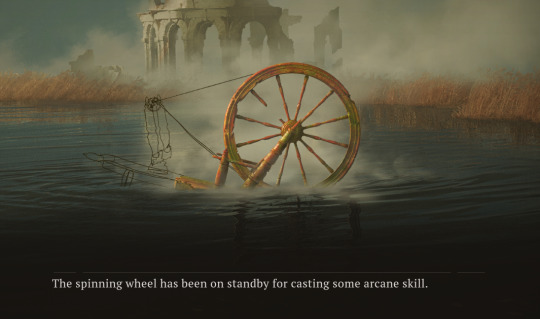
I left off in my discussion about The Wheel's connection to the Storm and it being the possible key to how it all works without really explaining it. This is why.
The Wheel doesn't just have the ability to create fog that repels the Storm within the suitcase, but also has the ability to summon arcanists.

Through a two dimensional golden thread weaved onto the spindle, it can't be felt tangibly and it doesn't seem to truly "exist" in that realm. But with enough of these "nonexistent lines" can Vertin call out to an arcanist and bring them there.
Specifically any arcanist of any timeline. Regardless of if they've ever been reverse into that era yet.
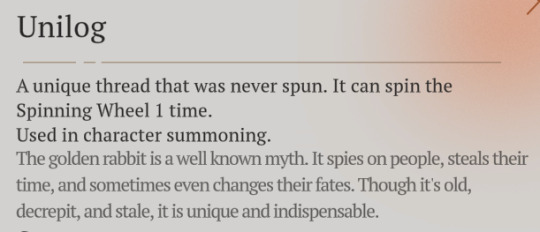
As well as the implication of summoning an arcanist not just from their timeline, but from another universe's timeline.
Now, I'm about to pitch you the conspiracy theory part of the essay, so entertain my insane ramblings for a bit because this is gonna be one of my hottest takes known to man.
Sonetto didn't survive the Storm in the prologue.
Here's my reason why I consider this a possibility:
We barely knew Sonetto's personality in the prologue, so it'd be easy to do this switch compared to doing it at a later date. But what we can glean from pre-1966 Storm and post-1966 Storm Sonetto is her immediate tonal shift.
Sonetto before the Storm is far more subdued with her way of speaking with Vertin. Professional and could even be considered more polite.

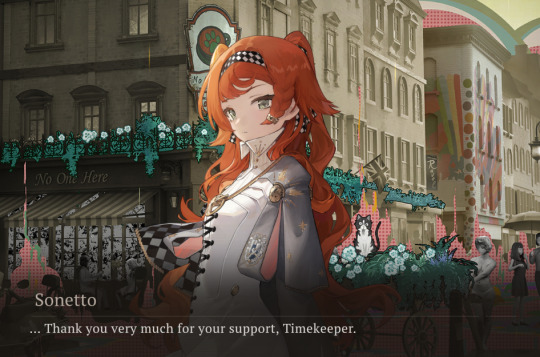
We can chalk this up as her being on Work Mode and with the Storm's arrival approaching, it's far more important to get the task done than her relaxing her mood.
So, let's think about why I think it's not possible for her to make it back to the Foundation on time. In the prologue, we see them discuss a new form of teleportation device still being improved by LaPlace.

It's a means to have a better way to teleport a large group of people from a much farther distance.
With this in mind, it's important that they have the disks to immediately evacuate because it'll take longer to get back to the safety of the Foundation. But they used all three of it. One to summon Vertin.

One to intercept the enemies.
And one-
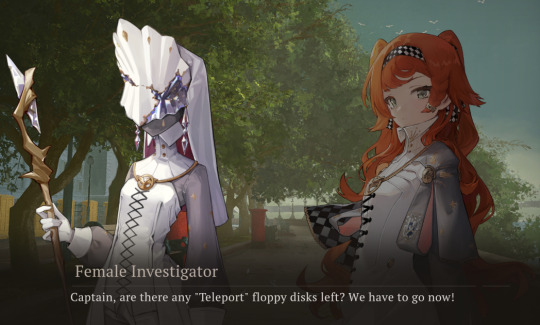


Was used by Regulus to escape.
And with that time, they only hade 45 minutes left before the Storm hits. Sonetto instructed her squad to go back ahead, leaving her to go with Vertin to investigate.
Even if we're absolutely generous in stating she can get far with using consistent fast travel arcane spells to move her to safety, how much time did she have?

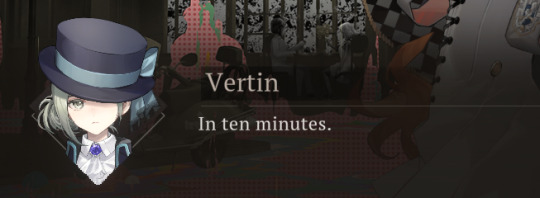
Not enough. Not even the best teleportation spell can get her back in time assuming the nearest London branch is just a subdivision away.
Speaking of teleportation spell, we can even use one of the teleportation spells as a reference. Aferoj Around.


It's one Sonetto suggested Vertin used to summon her, but immediately dismisses it as a possibility. It could be because of the fact that the range wouldn't make sense assuming that Sonetto's been summoned from the main headquarters all the way to where Vertin is. So even an advanced arcane skill like that can't just summon someone in that great amount of distance.
While it's also should be taken into account that with the reverse having send them from 1966 England all the way to 1929 America, it's still an impossibility if they were to still be within London. Because if that kind of spell is so easily executed consistently, then they wouldn't be developing the Teleport disk. It's an advanced skill for a reason and even that has limitations. So other less taxing teleport skill wouldn't have the distance needed to get Sonetto back in time.
Which brings us to post-1966 Storm Sonetto and the wild implication of her summoning. For one, her reaction is far more brighter and excited, familiar even. Much more like the puppy we consider her to be now. It can also interpreted as shock, but the demeanor compared to post-1966 Storm Sonetto at least has a slightly noticeable difference.

One of the biggest difference though, is this:
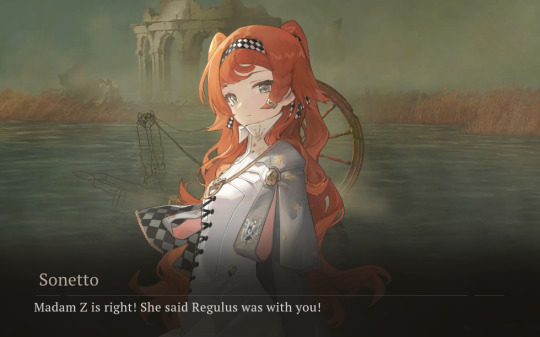

Madam Z somehow knew about what Vertin's doing and has instructed Sonetto specifically to seek her out.
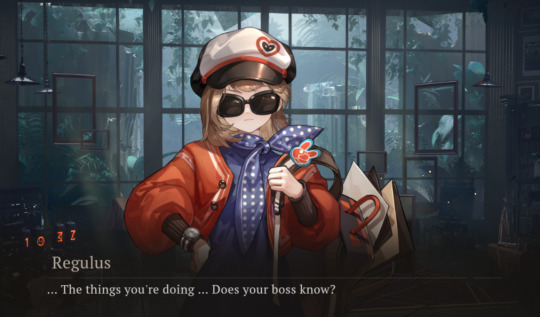
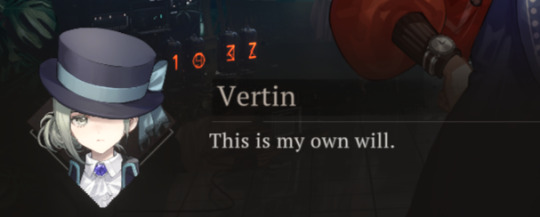
If we can believe in Vertin's words here, she's never told anyone about this. Not even Madam Z. So to boldly be told that they knew all along is a strange difference that even took Vertin off guard.
Why this is important is to ask you this. Just how much can you tell if someone is replaced with another version of themself? We're all lead to believe that those differences are drastic, but alternate universes doesn't have to be full blown change. It can be as simple as putting on your right sock first rather than the left that day.
Which is why it'd be so cruel and so sneaky to actually have done this switch in the first place. Because we don't know Sonetto enough to have noticed the change. And Vertin doesn't know her enough either after 4 years of not really being that close to her.
And how can I say this could be possible without a little bit more evidence to entertain it? Well, Chapter 5 is the reason I'm making this theory in the first place. And that's because of one person.
Diggers.
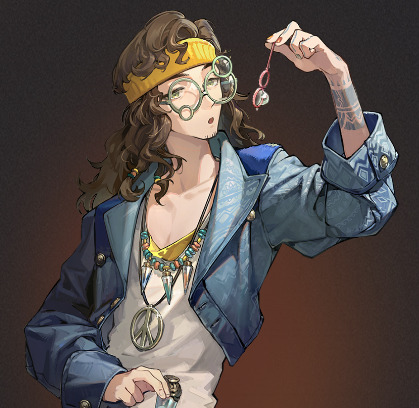
This man. THIS MAN.
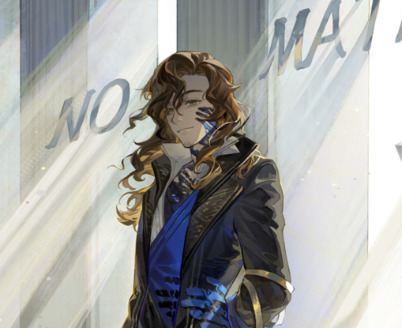
Canonically fukin joins the Manus. This manfailure is the sole reason, aside from one more reason but i'll get into later, why I thought about this possibility.
Because you can say that maybe after this event in the island he'll just defect to Vertin's team later after suffering the injustice of the arts or whatever, but I like to point back to one of the listed descriptions of Unilog's capabilities.

It can sometimes change the fates of people. So what I'm suggesting is that the Diggers we end up recruiting isn't the same Diggers, but an alternate universe one who didn't join the Manus as he was literally ripped from his timeline to join Vertin's instead.
This could explain many more of the characters in the roster being from timelines far into the past or even far into the future like John Titor. Heck, it explains dead people like Click and Poltergeist being there when they're supposed to be dead. Because summoning them through The Wheel has the potential to change their fate.
So yes, you can also argue that means Vertin did end up saving Sonetto from reversing and they actually do have their timeline's Sonetto still, but there's still the possibility that she's just another universe's Sonetto. She's both this timeline's Sonetto and not at the same time.
Schrodinger's Sonetto. (Note that this isn't the accurate use of Schrodinger's cat logic, it's mainly a joke)
Which now leads up to 100% the ultimate reason why I wanna pitch this idea as possible and y'all already know where I'm leading up to, this is just a huge build up to one thing and one thing only.
S C H N E I D E R.
THAT'S RIGHT. IT WAS SCHNEIDER ALL ALONG. You think I wouldn't go a single damn analysis without talking about my bbygirl? You're dead wrong. If this summoning system has the damn ability to yoink people from another universe and change their fate, then the possibility of getting Schneider back is far more real. Heck, you can even pull a version of her that actually IS an arcanist like y'all I fukin swear I'm not delulu, PLEASE--
ahem.
So that's my thoughts about what could unilogs do. I know it's extremely far fetched, but I like to entertain these ideas in hopes that it might give people a lot of other theories to craft!
#reverse 1999#reverse 1999 theory#this is more of a conspiracy theory than JUST a theory#I'm so sorry for this i've completely gone the deep end#it's months worth of brainrot exploding now that I'm free to catch up on things#I have a mouth so therefore I must scream#i wanna make a fanfic using this concept ngl#i have too many WIPs tho quq
114 notes
·
View notes
Text
My audhd brain won't stop telling me to do a full breakdown of the parallels between Percy and Hobie so i will.Alright,let's do this one last time!

Troubled but good kids
Afro-dominican New York/Jamaican-English(NY and England are where punk first started)
Anarchists,proffessional instigators,always helping out around communities(it's implied Percy participated in Rachel's protests and charities with her)and looking out for the little guy
So they're actual punks instead of just EdgyTM douchebags because they wanna do the right thing no matter what
No masking game autistics
Trans femmes who come across as masc only to normies
Chillaxed and super kind and love cute shit and people but also have major street credit,a huge edge and strong as fuck backbones and the reason they're so kind is that their childhood was beyond brutal so as they grew up they decided to be the positive older figure in younger people's lives they didn't take to have to the point they turned into Team Dad's
The EXACT same sense of humor
Blue-coded
Alt music lovers
Expressions are always either super intimidating or meme worthy goofy
Pet supernatural dog(Spidermutt and Mrs O'Leary)
Widely regarded as the coolest ever in-universe and correctly so but they're huge dorks when you get down to it but that only makes them even cooler-They were this cool the whole time
6'something with guitarist hands and described as so attractive it's shocking
Go by a nickname instead of their full name and have a common black surname
Oldest and most experienced heroes in their main casts
Hobie's dad is a deadbeat who left him as a baby to do supernatural shit
'I'm not a role model' 'I hate the a.m,i hate the p.m,i hate labels' 'I don't believe in consistency' / 'Was i a troubled kid?Yeah,you could say that' 'I AM impertenent' 'The sea does not like to be restrained'
'Calling yourself a hero makes you self-mythologizing'Hello???????????
Gwen is the Hazel to Hobie's Percy.She's a younger trans girl with a ghost motif who's a pastel ray of sunshine and runs her mouth as much as they do and has a dead mom,an abusive corrupted figure dad and their own impressive experiences in heroism before meeting them
Nico is another teen Ghostkid who Percy gifted a Ramones shirt and gave shelter to multiple times when he was homeless because Hades/Pluto is as much of a fucking cunt as George Stacy is.Nico is also a Miles kinnie because he's an optimistic softboy who's nerdy,a fast food lover and a lot stronger than he gives himself credit for and Percy is the big brother mentor to him the fandom thinks Hobie is to Miles(Nah fr Hobie and Miles are ambigious but Percy's canonically a grown ass man and Nico's Miles' age,P*rcicos pack it up and get over that your ship only works for transfem Percy proof)
Karl=Jason(the cooler St*ve R*gers,the actual voice of reason on the team but just as unhinged as the rest of them,very nice guy vibes and Hobie's righthand),Riri=Annabeth(Black girl genius who takes no shit but is still written as a person instead of a stereotype)and Mattea=Clarisse(red-coded,rowdy tomboy and war paint)
Mayday and Margo are basically just Estelle and Rachel,Jessica makes a pretty convincing Sally and Miguel reminds me of Poseidon but especially when he's interacting with Hobie
Sarcastic troublemaker smiles i've always found endearing(Rip to Annabeth but i'm different)(Also for Hobie i mean this platonically)
Immaculate rizz that's mostly unintentional but reaches critical levels when on purpose
Cocky asf and self-loathing at the same time
That one scene of Hobie leaving Gwen a Watch with the 'In case it don't work out' note with a lil doodle of him on it after getting her dad's ass/Percy sending the Olympians Medusa's head in a box after slaying her with a note saying 'Best wishes' to spite them
Goofy ahh who are nonetheless taken seriously cause Watch Out
They even both have terrible singing voices
And technically not the same thing but Hobie's also pink-coded so they're cotton candy colors and with Percy's white streak they can be the trans flag too!!
#bluepunk#hobie brown#percy jackson#perseo jackson#spidermutt#mrs o'leary#gwen stacy#hazel levesque#miles morales#nico di angelo#karl morningdew#jason grace#riri williams#annabeth chase#leah is our annabeth#mattea murdock#clarisse la rue#mayday parker#estelle jackson#margo kess#rachel elizabeth dare#jessica drew#sally jackson#miguel o'hara#poseidon pjo#hobie brown:destroyer of olympus#spiderpunk!percy#x black!reader#summerposting#💌
68 notes
·
View notes
Text
Guess who is starting a new thing because she totally doesn't have like 5 WIPs anyway? Meeeeeeee
Anyway, this will have multiple parts, but aside from some minor stuff there's no true chronological order I'm planning or anything.

"You can't seriously expect to keep me here."
The expression of complete and utter annoyance that adorned the face of the God of Death was one to behold. His eyes followed the movement of the deity beyond the set of bars separating them, but his arms remained where they were, folded across his chest as he stared the other down.
There was a mirthful smile on that sun-kissed face, a glint of mischief as the God of Spring eyed him with a mix of interest and marvel and pride, a combination that brought about naught but hybris, that had brought about the demise of Icarus and Bellerophon alike. A slight smirk played around his lips, and the eyes of the caged god narrowed farther yet.
"And why should I not? You have neither escaped nor tried to, have you?"
He continued his path along the living cage that had sprung up around the God of Death by virtue of the other's power alone. Bright blue eyes and wheat-blond hair, tanned skin and the muscles of a man, a God, who spent each and every day on the field and in the gardens.
The picture of a simple man, and yet he'd managed to trap the Lord of the Underworld so easily.
"As long as you are here, why should I expect anything less than for you to stay?"
The God of Death grit his teeth, fists tight around the trunks of what should have been decade-old olive trees, when really that living and growing cage that surrounded him had sprung up in a matter of seconds. A wide canopy of leaves had formed above him, a soft blanket of daisies and violets beneath his feet.
And yet, nothing was as pretty as it seemed.
He was trapped, at the mercy of a young, impulsive god, cut off from any source of power as the cage kept him bound to the mortal realm and as deep-running roots separated him from the black earth and the minerals it held.
He was bound, the King of the Dead trapped above ground as though all his power and subjects had lost value.
"Somebody will notice," he replied at last, "Somebody will notice, and when they do, they will apprehend you, foolish God-"
"Alfred."
The God of Spring had interrupted him, uncaring for his words or the danger they told of.
"Call me Alfred."
"Why should I, we're not-"
The God of Spring - Alfred - rolled his eyes, taking a step closer to that cage that had grown upon his wish, with little more than the wave of a hand and a wish on his lips. He reached out for him, a tanned, calloused hand reaching through the branches as though to caress his cheek.
At the last second the God of Death retreated.
Something flashed across the other god's face, but he couldn't quite name whatever emotion it was.
"You'll be here for a while," the other insisted after he'd regained himself. "I'll be the only one for you to talk to, so you might as well save both of us the time of using titles. So what will it be, Arthur?"
Arthur, God of Death, Ruler of the Dead, King of the third realm, had never been a devotee of making things easy, much preferred order and structure over the simplicity of chaos. He frowned, trying to force the other deity to join his subjects by virtue of his expression - the proverbial death glare - alone.
"It's funny of you to assume I'd wish to talk to you at all," he retorted curtly, "I live among the dead, it's not like I make a habit of talking to them either."
"And yet you talk to me."
Arthur folded his arms, leant back against the trees that formed the back of that little bit of green he was confined in, lips pressed together in a fine line as he remained silent.
The other god merely laughed.
"Is the silent treatment really how you want to convince me to release you?" Alfred questioned, still snickering to himself, as he charmed a small ivy tendril to climb up the stem of one of the trees, snaking around the stem and the branches and higher yet.
"Guess I'll just have to decorate your new home with sunflowers and daisies all over."
"Don't you dare."
"Oh, you bet I will."


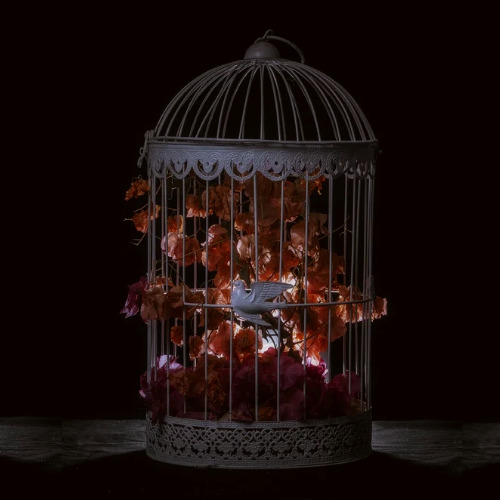



#fanfiction#usukus#aph america#aph england#aph hetalia#writing#hades persephone#greek myth retellings#CK myth AU
6 notes
·
View notes
Text



LONDON, ENGLAND - FEBRUARY 17: (L to R) Clara Amfo, Holly Blakey, Zawe Ashton and Arch Hades attend the Roksanda show during London Fashion Week February 2024 on February 17, 2024 in London, England. (Photo by Hoda Davaine/Dave Benett/Getty Images)
66 notes
·
View notes
Photo
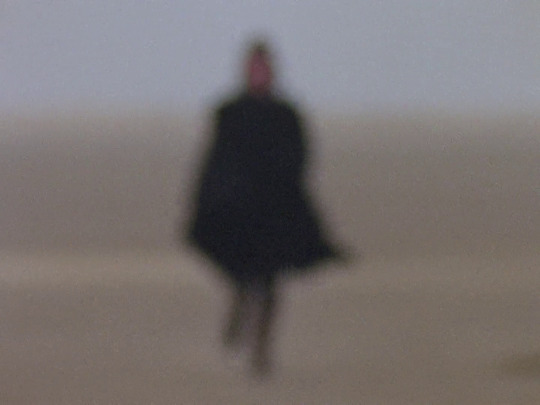
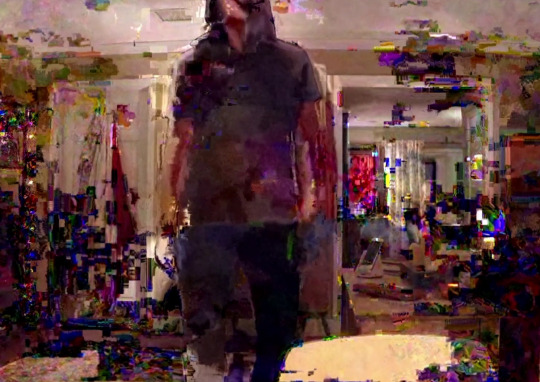
A Warning to the Curious (Lawrence Gordon Clark, 1972)
Unfriended: Dark Web (Stephen Susco, 2018)
“The template for the perfect scary story is pretty much set in stone, and it’s unlikely that any technological advancement is going to change that. The ghost tales devised by the Victorian writer M.R. James at the beginning of the 20th century will remain the bedrock for the genre as we know it. [...] [H]e alighted upon and would consistently return to a basic, endlessly reproducible scenario: an antiquarian or scholar, usually fusty, male, and set in his ways, comes into possession of a relic, manuscript or other object of mysterious provenance and great interest, and this item turns out in some way to be haunted and/or coveted by the being who once owned it. [...]
One of the few recent horror movies that gave me the particularly Jamesian pit-of-stomach dread that comes from peeking a little too far below the surface of our seemingly safe everyday existence is 2018’s Unfriended: Dark Web, Stephen Susco’s rigorously conceived sequel to the also impressive yet more predictably moralizing Unfriended (2014). It’s perhaps a film that few would upon first glance consider classical or elegantly shaped, yet Dark Web’s ruthless exploitation of contemporary fears—of losing one’s identity, of being found out, of making one wrong misstep that has everlasting consequences—are firmly rooted in the scary story template. In “Oh Whistle,” the young professor Perkins absconds with an ancient, hieroglyphic-laden whistle he discovers buried in the sand amongst the groynes of a coastal town in eastern England; he later makes the mistake of blowing it. In Unfriended: Dark Web, our ostensible hero Matias (Colin Woodell), pilfers a laptop from a coffee house’s lost and found; it’s not as magical as the strange artifact buried on a rocky shore, but it’s useful for his purposes, and, like Perkins, he definitely should have left it where found it.
As in the classic ghost story, the owners of the object are coming back to claim it—in this case black-hooded figures who might be real, but who appear as staticky, pixellated manifestations of otherworldly evil. Or perhaps underworldly evil: as the title implies, this thing goes deep, man, all the way down to the heavily encrypted world of darknet that has inspired countless contemporary urban legends, here envisioned as a journey to Hades by rowboat, animated with rudimentary, Atari-era graphics. As though they’ve been hit with a fatal computer virus, all of his friends—who have gathered in their respective spaces to partake of “game night”—also are, in a sense, infected by association. The film’s logic is like a less literal Ringu: as soon as one sees the horrifying images, there’s no way back. The excavations of the dark web are essentially files buried deep within our collective subconscious.” — Michael Koresky, A Few Great Pumpkins XIV
#i HAD to make up for my lack of unfriended posts#this is what my brain looks like if u care etc#a warning to the curious#unfriended: dark web#stephen susco#horror#caps#comparatives#w*#found footage
48 notes
·
View notes